

In this Resource Centre, we will uncover and explore information on the natural bodily response and psychological occurrence known as stress.
Click on the tab for a brief summary of the article !
What Is Stress ? Is It Perpetually Bad?
[1] Centre for Studies on Human Stress.
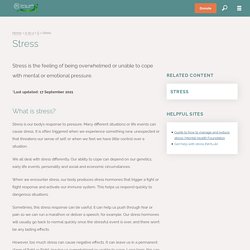
Recipe for Stress: Retrieved on 4 Apr 2018 from: [2] Segerstrom SC & Miller GE (2004) Psychological Stress and the Human Immune System: A Meta-Analytic Study of 30 Years of Inquiry. Psychological Bulletin, 130, 601-630. [3] American Psychological Association. Stress: Retrieved on 20 April 2018 from: [4] Adamo SA (2014) The effects of stress hormones on immune function may be vital for the adaptive reconfiguration of the immune system during fight-or-flight behaviour. . [5] The Physiological Society (2017) Stress in Modern Britain. . [6] Hammen C (2005) Stress and Depression. . [7] Stroud, CB, Davila J & Moyer A (2008) Journal of Abnormal Psychology, 117, 206-213. [8] Bonde JO (2008) Psychosocial factors at work and risk of depression: a systematic review of the epidemiological evidence.
. [9] Health Executive Agency (2017) Work-related stress, depression or anxiety statistics in Great Britain 2017. [19] Berger, M., & Sarnyai, Z. (2015). Types of Stress. Understanding stress can help you know more quickly when you need help.
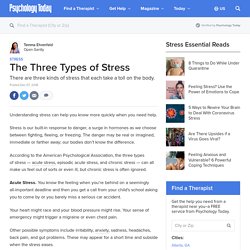
Stress is our built-in response to danger, a surge in hormones as we choose between fighting, fleeing, or freezing. The danger may be real or imagined, immediate or farther away; our bodies don’t know the difference. Short Video On The Differences Between Acute Stress and Chronic Stress. Stress in the Workplace. Whatever your work demands, there are steps you can take to protect yourself from the damaging effects of stress, improve your job satisfaction, and bolster your well-being on and off the job.
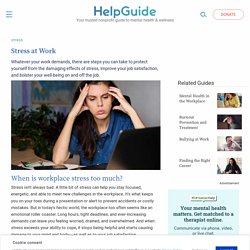
When is workplace stress too much? Stress isn’t always bad. A little bit of stress can help you stay focused, energetic, and able to meet new challenges in the workplace. It’s what keeps you on your toes during a presentation or alert to prevent accidents or costly mistakes. But in today’s hectic world, the workplace too often seems like an emotional roller coaster. You can’t control everything in your work environment, but that doesn’t mean you’re powerless, even when you’re stuck in a difficult situation.
Understanding Work Stress: Causes & Symptoms. Posted September 4, 2015 | By Tricia Hussung Based on an annual survey from the American Psychological Association (APA), 60 percent of people in the United States consider their job a major source of stress.
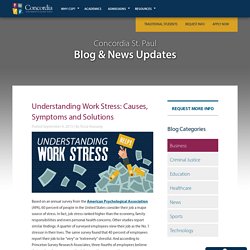
In fact, job stress ranked higher than the economy, family responsibilities and even personal health concerns. Other studies report similar findings: A quarter of surveyed employees view their job as the No. 1 stressor in their lives. The same survey found that 40 percent of employees report their job to be “very” or “extremely” stressful. Well being Survey Report. 4) Find Out How Stress Are You: Workplace Stress Survey.
The General Adaptation Syndrome. Psychoneuroimmunology. Video: How stress affects your body. The Harmful Effects of Stress At Work. During college, students spend about four years stressing over assignments, deadlines and adapting to new environments.
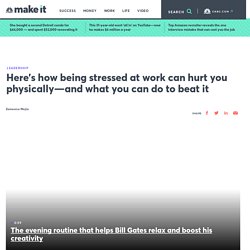
As they prepare to enter the workforce, the pressure to meet academic expectations gets replaced with high career expectations and the stress continues. Although a constant state of stress has become the new norm for many working adults, the physical and mental toll is crippling their chances at success, esteemed workplace and happiness experts Annie McKee and Emma Seppälä argue in their research. “Most of us work more than eight hours a day,” McKee writes in her latest book “How To Be Happy At Work” based on decades of working with Fortune 500 companies. “That means that if we are unhappy at work, we are miserable from more than a third of our lives.” McKee notes that “slow-burning stress, anger and other negative emotions can literally kill us.”
Why you’re probably feeling so stressed at work This is ultimately not a sustainable way to live. The Long-term Effects of Stress. How Chronic Stress Harms Your Body. The one factor causing depression and anxiety in the workplace. The Cause of Stress: Types of Stressors. By Mary Elizabeth Dean Updated November 15, 2019 Reviewer Heather Cashell.
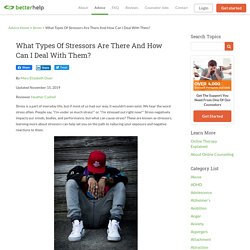
How does Stressors become Stress?: Cognitive Appraisal. According to Richard Lazarus, stress is a two-way process; it involves the production of stressors by the environment, and the response of an individual subjected to these stressors.
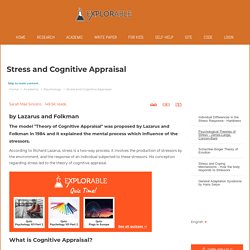
His conception regarding stress led to the theory of cognitive appraisal. What is Cognitive Appraisal? Lazarus stated that cognitive appraisal occurs when a person considers two major factors that majorly contribute in his response to stress. These two factors include: The threatening tendency of the stress to the individual, and The assessment of resources required to minimize, tolerate or eradicate the stressor and the stress it produces.
In general, cognitive appraisal is divided into two types or stages: primary and secondary appraisal.
Good vs Bad: Eustress and Distress. Top 5 Triggers for stress in the workplace. Stress Management: Emotional-Focused vs Problem-Focused Coping Strategies. By Saul McLeod, published 2015 Stress arises when individuals perceive a discrepancy between the physical or psychological demands of a situation and the resources of his or her biological, psychological or social systems (Sarafino, 2012).
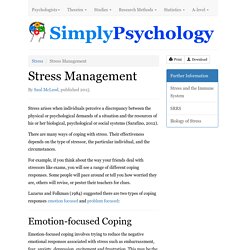
There are many ways of coping with stress. Their effectiveness depends on the type of stressor, the particular individual, and the circumstances. For example, if you think about the way your friends deal with stressors like exams, you will see a range of different coping responses. Some people will pace around or tell you how worried they are, others will revise, or pester their teachers for clues. Lazarus and Folkman (1984) suggested there are two types of coping responses emotion focused and problem focused: Emotion-focused Coping Emotion-focused coping involves trying to reduce the negative emotional responses associated with stress such as embarrassment, fear, anxiety, depression, excitement and frustration. Critical Evaluation. Psychology 101: The Two Types of Coping.
Problem-Focused Coping. 6 Tactics to Combat Work Stress.